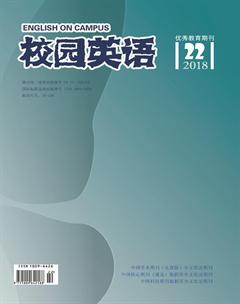Simple analysis incidental vocabulary acquisition through L2 listening
Xu Yilin
【Abstract】This article records the reading experience of foreign language vocabulary knowledge acquisition and listening comprehension of second language incidental vocabulary incidental summary, learning a lot of L2 vocabulary research thinking, from more dimension way to think about the problem.
【Key words】L2 listening; vocabulary
【作者簡介】Xu Yilin,渤海大学外国语学院。
In the field of language learning, vocabulary is like a block of cornerstone in the tall building of language, which is the most basic unit factor in the language organization and the key to whether it can learn the second language well. Vocabulary mastery is not the decisive factor in language communication, but without word accumulation, it will affect human communication. According to the universal grammar hypothesis, humans can encode the vocabulary in words to produce words and sentences. In other words, the vocabulary is the language material, there is not enough material is unable to activate the process of language coding, vocabulary acquisition has many ways, but also affect the second language acquisition in all aspects of listening, speaking, reading and writing .
To systematically understand the development of incidental vocabulary acquisition and to further study on the premise that the classification and definition of vocabulary knowledge. The definition of vocabulary knowledge can be divided into different categories from different aspects, and the categories of vocabulary knowledge can also be divided from different dimensions.Hernriksen (1999) divides lexical knowledge into three dimensions: 1. partial lexical knowledge and exact lexical knowledge; 2. lexical depth knowledge; and 3. receptive lexical knowledge and productive lexical knowledge. Part of the vocabulary refers to the learner learns how much the amount of vocabulary knowledge is a range of concepts; exact vocabulary refers to learners of vocabulary knowledge of the quality of the situation. Vocabulary depth of knowledge to do a deep study of quality, learners can freely grasp the vocabulary proficiency in listening, speaking, reading, writing and other aspects. Listening and reading are divided into receptive skills, speaking and writing are divided into productive skills.
Lexical knowledge can also be categorized according to breadth and depth (Anderson & Freebody, 1981), distinguishing between quantity and quality, breadth refers to quantity, that is, the number of words a learner masters, and depth refers to quality, refers to the learner for a vocabulary grasp of all aspects of the situation.Extensive research results show that the breadth and depth of vocabulary development are unbalanced. The acquisition of breadth vocabulary is much faster than that of deep vocabulary. Wide vocabulary learning is easy to form in a short time, while deep vocabulary learning is more difficult. The reason for this situation is that the majority of learners think the difficulty of language learning is that they have less vocabulary, so the one-sided pursuit of the number of vocabulary does not pay attention to both the depth and the quality of the vocabulary at the same time.Second, due to the widespread foreign language testing focus on the acceptance of the vocabulary test, the use of objective questions, judgment questions and acceptance of the majority of questions, but less involved in the study of deep vocabulary, which led to the side of the learner for less deep vocabulary concerned, and deep vocabulary acquisition learners need to spend more time and energy.
Affected by the traditional education in China, most learners simply think that learning vocabulary is the mastery of a large number of hoarding words without going deep into the quality of vocabulary, which will hinder the further development of second language acquisition. In-depth research and meticulous classification of vocabulary knowledge help to test learners deficiencies and weaknesses, as well as help learners learn from rote learning methods toward learning methods that are close to understanding.
The rigorous way of thinking and the scientific spirit of seeking truth and being pragmatic deserve our respect. Junior learners should accumulate more experience of predecessors research and provide their own research results for language research according to the actual situation. It is the obligation of every language learner to promote the development of language research.
References:
[1]Henriksen,B.(1999).Three dimensions of vocabulary development.[J].Studies in Second Language Acquisition 21,303-317.

